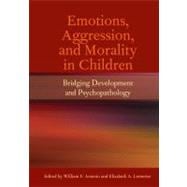
Note: Supplemental materials are not guaranteed with Rental or Used book purchases.
Purchase Benefits
What is included with this book?
| Contributors | p. ix |
| Introduction: An Integrative Approach to Emotions, Aggression, and Morality | p. 3 |
| Theoretical Foundations | p. 11 |
| Emotion in Early Conscience | p. 13 |
| Taking Emotions Seriously: The Role of Emotions in Moral Development | p. 33 |
| Rage, Revenge, and Precious Pride: Emotions in Information Processing by Children With Aggressive Behavior Problems | p. 53 |
| Integrating Emotion Attributions, Morality, and Aggression: Research and Theoretical Foundations | p. 75 |
| From Neuroscience to Culture: Factors Influencing Aggression and Morality | p. 95 |
| Empathy, Moral Development, and Aggression: A Cognitive Neuroscience Perspective | p. 97 |
| Empathy-Related Responding and Moral Development | p. 115 |
| Callous-Unemotional Traits and Aggression in Youth | p. 137 |
| Emotions and Social Information Processing: Implications for Understanding Aggressive (and Nonaggressive) Children | p. 157 |
| The Development of Moral Emotions in a Cultural Context | p. 177 |
| Assessment, Interventions, and Clinical Perspectives | p. 199 |
| The Role of Anger in Children's Reactive Versus Proactive Aggression: Review of Findings, Issues of Measurement, and Implications for Intervention | p. 201 |
| The Etiology of Youth Violence: A Cognitive-Emotional Model | p. 219 |
| The Coping Power Program for Anger and Aggression in Children: Targeting Arousal and Cognition | p. 239 |
| Index | p. 259 |
| About the Editors | p. 269 |
| Table of Contents provided by Ingram. All Rights Reserved. |
The New copy of this book will include any supplemental materials advertised. Please check the title of the book to determine if it should include any access cards, study guides, lab manuals, CDs, etc.
The Used, Rental and eBook copies of this book are not guaranteed to include any supplemental materials. Typically, only the book itself is included. This is true even if the title states it includes any access cards, study guides, lab manuals, CDs, etc.